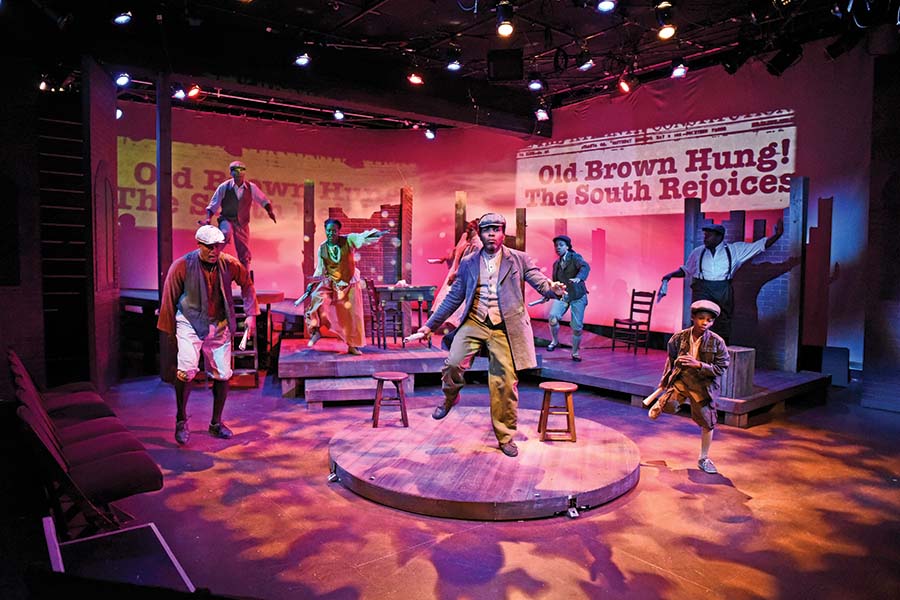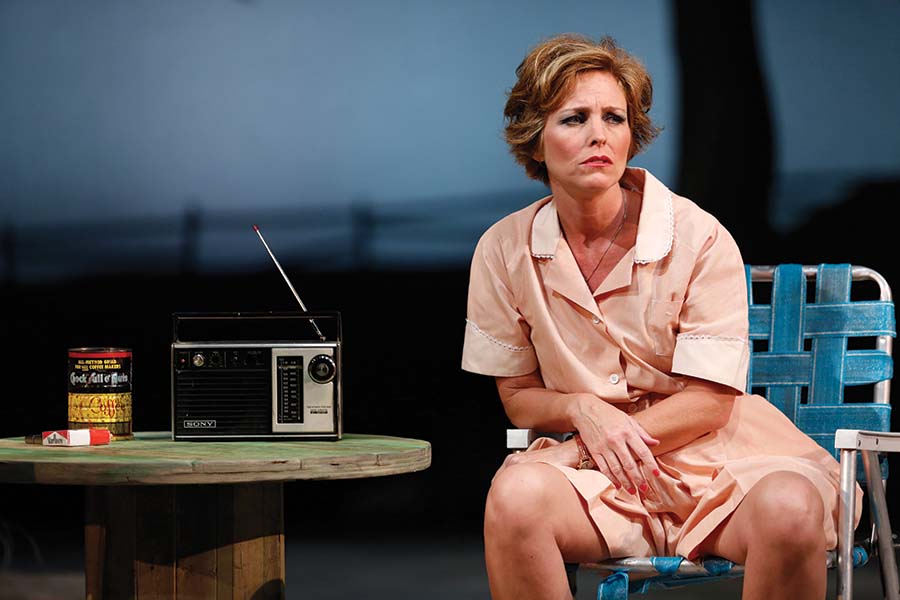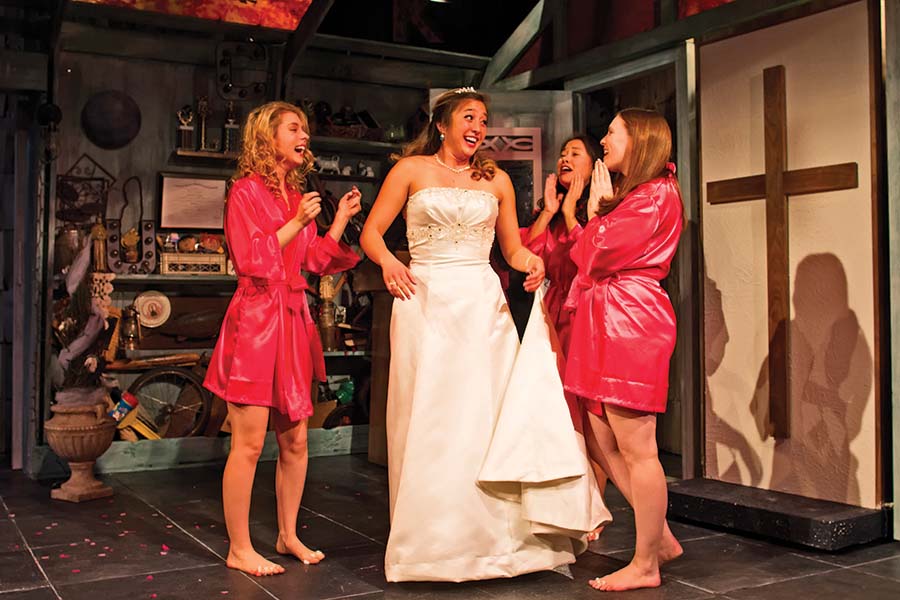Horizon Playwrights Featured in National Magazine!
October 19th, 2016


Gabrielle Fulton’s UPRISING • Cynthia D. Barker, Enoch King, Brian Kurlander, Anthony Manough, Margo Moorer, Jaden D. Robinson, LaParee Young (no order)
Southern Female Playwrights, Leaving the Front Porch Behind
The South depicted by an emerging group of playwrights is complicated and diverse, and there’s not a mint julep in sight.
When the levees break in New Orleans, a doctor ventures into the flood waters of Hurricane Katrina to find his beloved wife. What he discovers underwater is a club called the Gumbo Pot—evidence that the vibrant spirit of the Crescent City can never be washed away.
Almost 700 miles away in Titusville, Fla., a veteran returns home covered in burns after her latest tour of duty, only to find that her hometown has changed almost as much as she has.
In Yazoo City, Miss., sisters Nola and Nell are living on the outskirts of town during the last days of school desegregation. Then one day a woman shows up from Chicago claiming to be their sister. There’s just one problem: They’re white and she’s black.
These stories are not born of the Spanish-moss-and-sweet-tea-on-the-front-porch South of Tennessee Williams, or the sepia-toned nostalgia of Horton Foote. They are all from plays by a new generation of Southern-raised female writers who are telling stories of today’s South and infusing their personal journeys as Southern artists into their work. As such they may prove a powerful antidote to prevailing attitudes about the region, which, if you take the last 10 years of American Theatre’s Top 10 most-produced plays list as a guide, was represented exclusively by To Kill a Mockingbird, The Whipping Man, The Glass Menagerie, and The Mountaintop.
Meanwhile, closer to home, these local artists are taking that old national perception out of the rocking chair, off the plantation, and into the new millennium. That’s not to say they’re overlooking the area’s dark racial history in their work. But they are giving contemporary social context to the diversity and complications of today’s South.
“One of the greatest misconceptions in the theatre about the South is that we’re all living in a Tennessee Williams play,” said playwright Daryl Lisa Fazio. “Then there’s the accent, where you’ll see characters talk like they’re in a Tennessee Williams play but they’re in the Delta. Then again, what are people given about the South in the media?”
Fazio grew up in Starkville, Miss., and is currently based in Atlanta. While she originally dreamt of being an actor after studying theatre at Northwestern University, she found her way to playwriting while teaching graphic design at Truman State University. There she acted in a play called Parallel Lives; she relished the experience, yet when she looked for more roles for strong Southern women, she realized there weren’t many. As she started to get to know area theatres by freelancing for them as a graphic designer (her current clients include Atlanta’s Horizon Theatre Company and Actor’s Express, as well as Florida Repertory Theatre in Fort Myers), she began to write plays with those missing roles.
“I’m not college-educated as a writer,” Fazio admitted. “I was learning from every play I read who I wanted to be and what I wanted to say. I realized I wanted to write roles for women. I also realized that there were a lot of things about race that I didn’t understand.”
Race and womanhood are central themes in her play Split in Three, about sisters who find their Mississippi town changing due to school integration. The show premiered at Florida Rep last year and will be produced at Atlanta’s Aurora Theatre next May. And her new play Freed Spirits, set in Atlanta’s historic Oakland Cemetery, is playing at Horizon Theatre Sept. 23-Oct. 30.
Fazio says that her stint at Northwestern reshaped her views, in particular on racism. “When you’re around race every day you think you’re not racist, because you’re so heavily Baptist,” she suggested. Studying just outside of Chicago, also a deeply segregated city but with different attitudes about it, opened her eyes. “You realize you’re all these things you didn’t know. I was part of a very small, conservative world growing up, and when I left for college in the big city, that all changed. There was more than one way to do everything, including seeing other races.”
Race and history are also significant influences in the work of another Atlanta-based playwright, Gabrielle Fulton. Her grandfather’s tales about his mother picking 100 pounds of cotton a day, mixed with the clandestine stories of slave rebellions in the South, became the basis for her play Uprising. The piece had a rolling world premiere at Horizon Theatre in Atlanta and Alexandria, Va.’s MetroStage last year.
“There was a pride he had in her, and there isn’t a lot of pride associated with our ancestors who picked cotton,” recalled Fulton, who also studied at Northwestern. “I wanted to honor that strength and work ethic and provide a story to make these people real instead of something you just read about in history books.”
In the play, a woman named Sal who lives in a community of freed black people in Harper’s Ferry, W.Va., meets a man who is the lone survivor of John Brown’s raid; together they must figure out what freedom means to them.
“Uprising is a play set before the Civil War told from the perspective of African Americans, not white people, which is a thing that has been missing,” Fulton said of the play, excerpts of which were also presented during an event at Raleigh, N.C.’s Mordecai Plantation, “Reclamation: Plays by Female Voices of Color.”
Two of her other plays, The Seed Planter (about a Civil Rights activist whose daughter resents her choice to prioritize progress over parenting), and Passing Black (a commission from Clark Atlanta University that takes place during its first African-American art annual in 1942, at which a woman who appears to be white submits a piece), are also told from the perspectives of black women. This point of view is not always welcome; indeed, before Uprising was staged last summer, many artistic directors told Fulton that the play would never be produced. Some seemed to think that a play written from a black woman’s perspective would have limited the play’s audience appeal. Fulton rejects the notion.
“It’s a challenge being an African-American female playwright in the South,” she admitted. “You really have to make a case for why your story is worthy. Everything is extremely hard, but I’m going to keep doing it.”

Diversity and representation onstage are also very important to Leah Nanako Winkler, who is half Japanese and half white. She wrote her play Kentucky as an ode to the place where she grew up, Lexington. In the play, 30-year-old Hiro, who has defected to New York City, comes back home when her younger sister, a born-again Christian, gets engaged. Hiro thinks she is going back home to save her sister from a life of being barefoot and pregnant, but both must learn to accept the different people they have become. The play is not autobiographical, but is inspired by her life—Winkler’s real-life sister is a born-again Christian; the characters are, like her, mixed-race; and she has lived in New York for a decade.
“I don’t really see a lot of plays about the South, but when I do it’s about poor people who are white,” Winkler said. She points out that Lexington has a sizable Japanese population we don’t hear about much in the news, let alone see onstage. “I went to Japanese school. I went to a diverse high school. My mom was a piano teacher. There were poor people, but there was also horse country.”
Winkler is working on her MFA in playwriting at Brooklyn College, and was one of the Youngblood playwrights at NYC’s Ensemble Studio Theatre, where Kentucky premiered in April. It will be produced at East West Players in Los Angeles, Nov. 10-Dec. 11.
“A lot of people don’t even know that there’s theatre in Kentucky,” Winkler pointed out, but it was high school theatre that inspired her to become an artist. “I got an amazing education in a place where not a lot of people think people are educated.”
Christina Quintana, who has Cuban roots, shares Winkler’s sentiment about her Southern theatre education; she credits the performing-arts high school New Orleans Center for Creative Arts, and her time as an intern at Southern Rep in that city, with sparking her interest in theatre. Her musical Gumbo, which was workshopped at the Finger Lakes Musical Theatre Festival in central New York, is set during Hurricane Katrina, which hit New Orleans during her senior year of high school.
The play approaches the subject via the classic story of Orpheus and Eurydice. Quintana admits that for years she avoided writing about the storm, as it was all anyone ever talked about when they referred to New Orleans. But then she met composer Brett Macias at Columbia University, and the story came to her in a dream; it seemed serendipitous.
“History tells us where we come from, and I always want to be in conversation with the people who paved the way for us,” said Quintana, who is also a Youngblood playwright at EST. “As an early playwright, I felt like I needed to avoid the classics and that new plays were the only way. Suddenly I realized that all great stories are somehow rooted in one another, and there are so many wonders and tricks of the trade to be gained from the classics.”
NOLA also serves as the backdrop for her play Scissoring, which was a finalist for the Alliance Theatre’s Kendeda Award in 2014, which is about a teacher at a Catholic school forced to choose between her career and the life she’s built with her longtime girlfriend.
“I believe there’s a lot of the extraordinary in our everyday lives, if only we look for it,” Quintana said, “and theatre gives us the opportunity to explore this head on.”

Lindsey Ferrentino’s roots in Merritt Island, Fla., along with her interest in what happens to veterans when they return home from war, inspired Ugly Lies the Bone, which is running at Atlanta’s Alliance Theatre Sept. 16-Oct. 9. It had its world premiere at Roundabout Theatre Company in NYC, and Ferrentino is currently adapting it for a potential television series. The play follows a veteran who returns to her Floridian hometown just as the space shuttle program is closing. The work hits very close to home for Ferrentino.
“I grew up under a banner that said, ‘Welcome to Merritt Island—where dreams are launched,’” she said. “I went away to college around the same time as NASA’s layoffs and the space shuttle program shutting down, and came home to an area whose landscape drastically changed, both physically and economically. I began to notice a parallel between the town looking for a way to start over and soldiers looking for the same thing, in an area that had little opportunity to offer them.”
Scenes in Ugly alternate between Jess’s hometown and a virtual-reality therapy being used to treat veterans in perpetual pain. Ferrentino says she would like audiences to walk away with more empathy for veterans, and to be in a communal space where they have no choice but to witness the physical, personal, and domestic cost of fighting foreign wars. She also aims to show off her South, noting that there is a difference between Floridians and Southerners.
“I don’t think of my area as a place where debutante balls or Southern gentility is really a thing,” said the playwright, who recently won the prestigious Kesselring Prize for Ugly Lies the Bone. “My South—or a version of it, based on my hometown—is faster, brighter, and gloriously tackier. There are cruise ships and rocket launches and Mickey Mouse and the Fountain of Youth.”
For these young female playwrights, in other words, the South is a microcosm for exploring bigger social issues: race, class, war. At the same time, they are updating and reshaping the Southern narrative onstage, writing from viewpoints that are rarely seen. Bypassing the columns and gazebos of the past, they are paving a way for more daring works by artists south of the Mason-Dixon Line to take the national spotlight.
“The South has a very dark history, but also a rich one,” said Quintana. “It’s important that we acknowledge both of these things, and it’s important that we tell the full story. The South is full of so many stories, voices, and fantastic figures, past and present. There are vibrant companies and theatre artists across the South who are pouring themselves into creating quality theatre. This must be known and celebrated!”
Kelundra Smith is an arts journalist based in Atlanta.
A version of this story appears in the October 2016 issue of American Theatre.

